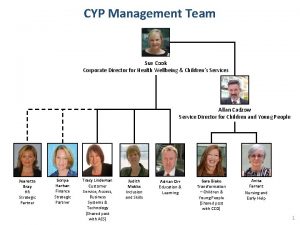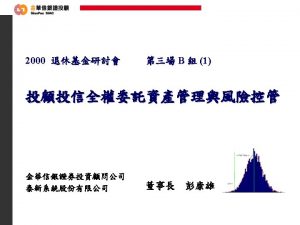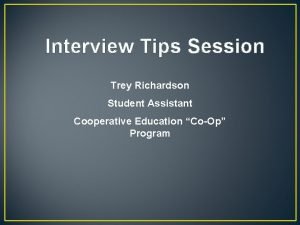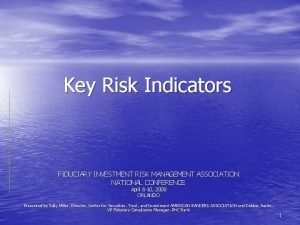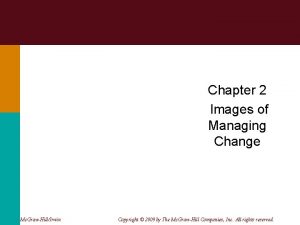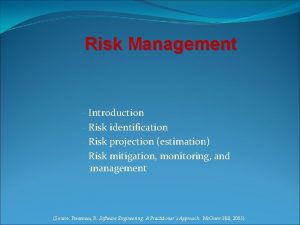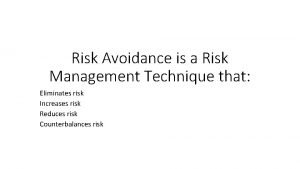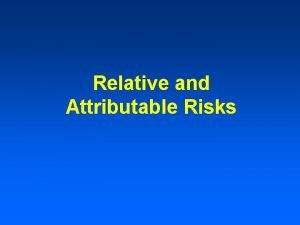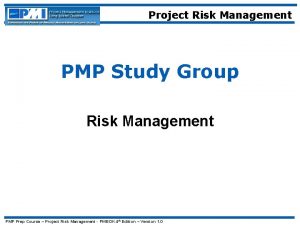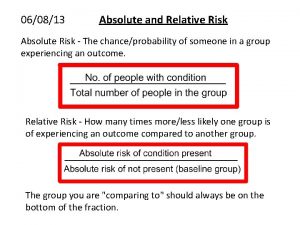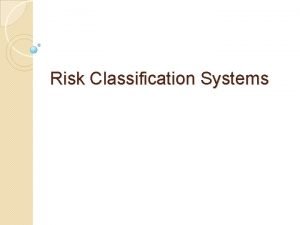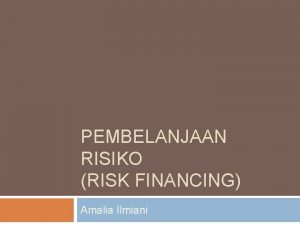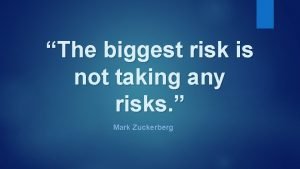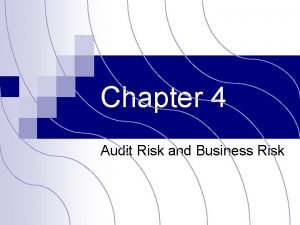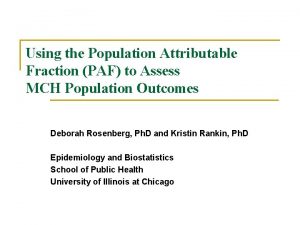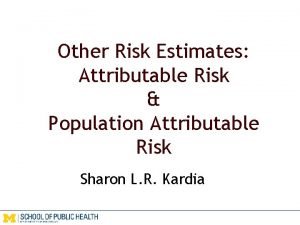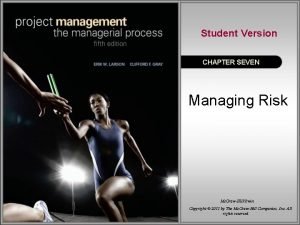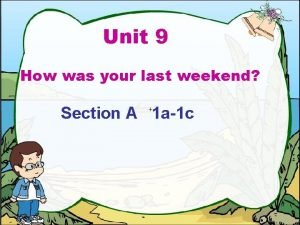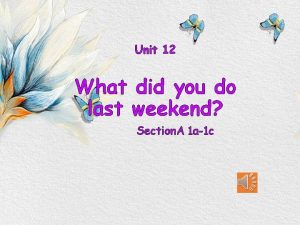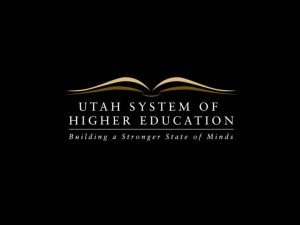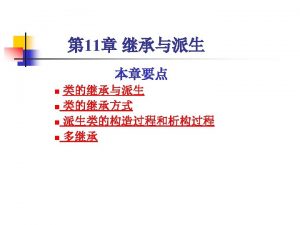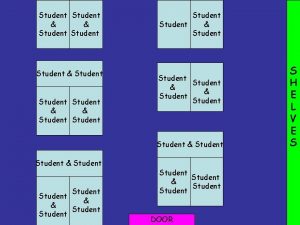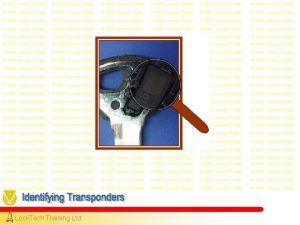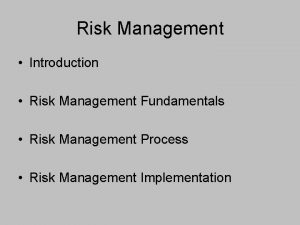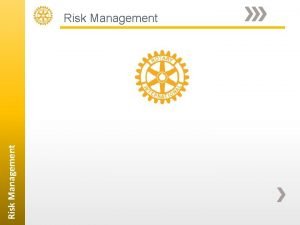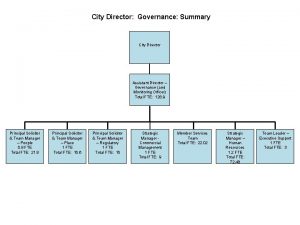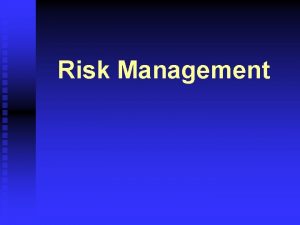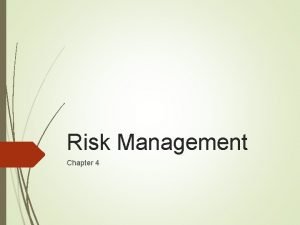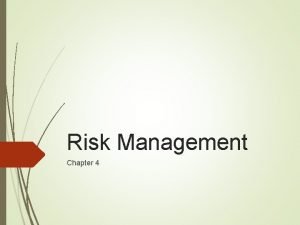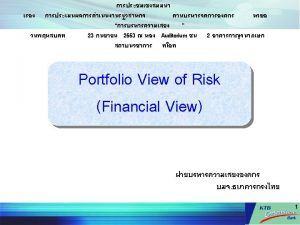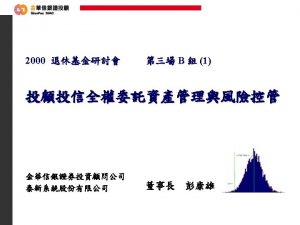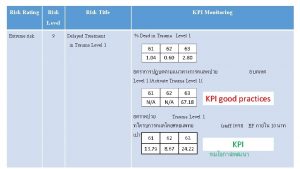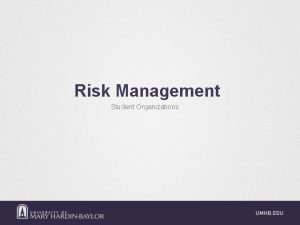Risk Management Jeremy Sippel Assistant Director Student Government

































- Slides: 33

Risk Management Jeremy Sippel Assistant Director, Student Government Association and Student Organizations

Topics to be covered • Alcoholic beverages, illegal drugs, and penalties • Hazing • Sexual Abuse and Harassment • Fire and other safety issues • Firearm, weapon or explosive device • Travel • Accessibility

Alcoholic Beverages, Illegal Drugs, And Penalties • Public Intoxication- occurs when a person appears in public while intoxicated to the degree that the person may endanger themselves or others due to the impairment of mental/physical faculties. • Generally you get to sober up in a jail, unless there is a responsible sober adult that is willing to accept responsibility for you and the officer deems it not necessary for a trip to jail. • Minor in Possession- A person under the age of 21, found to be in possession of an alcoholic beverage of any kind • Minor in Consumption- A person under the age of 21, consuming any alcoholc beverage, EXCEPT if the minor is with their parent or spouse and is giving them the alcohol to consume

Alcoholic Beverages, Illegal Drugs, And Penalties • Purchase/Furnish Alcohol to a Minor • Up to $4, 000 and up to 1 year in jail • Furnishing alcohol to a minor or providing a place for a minor to consume is considered a serious Class A misdemeanor. • For example; organization is hosting a party at their house, a minor comes to the party and consumes alcohol provided by the organization, the organization can be held responsible for furnishing alcohol to a minor.

Alcoholic Beverages, Illegal Drugs, And Penalties • Driving While Intoxicated (DWI) • A person is DWI when having a blood alcohol concentration of 0. 08 or more while operating a motor vehicle. • 1 st offense is a Class B misdemeanor • Fine up to $2, 000, confinement in jail up to 180 days, and license suspension 90 days to 1 year • 2 nd offense is a Class A misdemeanor • Fine up to $4, 000, confinement in jail a minimum of 30 days & up to 1 year, and license suspension 180 days to 2 years • 3 rd offense is a 3 rd Degree Felony • Fine is up to $10, 000, 2 to 10 years in prison, and license suspension 180 days to 2 years

Alcoholic Beverages, Illegal Drugs, And Penalties • University policy • “Alcohol use, possession, manufacturing, or distribution of alcoholic beverages (except as expressly authorized by University regulations), is prohibited on University premises and University-sponsored events. Students are expected to comply with all state and local laws, as well as all Residential Living and Learning regulations regarding the presence of alcohol in the residence halls (see University Housing Policy). ” (TAMUC Student Code of Conduct)

Alcoholic Beverages, Illegal Drugs, And Penalties • University policy Possession or consumption of alcohol by anyone under the age of 21 is prohibited. Providing alcohol or access to alcohol to anyone under the age of 21 is prohibited. Being found in a state of public intoxication or drunkenness is prohibited. Possession of common containers (e. g. kegs, trash cans, etc. ) on campus is prohibited. • Operating a motor vehicle or another form of transportation while intoxicated or while under the influence of alcohol is prohibited. • Violating any provision of the Code of Student Conduct while under the influence of alcohol is prohibited • •

Alcoholic Beverages, Illegal Drugs, And Penalties • Possession of Drugs • Possession of a usable quantity of marijuana (2 oz. or less) is an offense under state law, and a Class B Misdemeanor • Fine up to $2, 000 and confinement in jail up to 180 days • Possession of heroin, cocaine, methamphetamine, methadone, psilocin, mescaline, and The Opiates • Possession of these major drugs carries varied punishments and even the possession of only a single usable amount still carries a State Jail Felony punishment. • Fine up to $10, 000, up to 2 years in jail (unusable amount), 15 -99 years or life and up to $250, 000 fine (usable amount)

Alcoholic Beverages, Illegal Drugs, And Penalties • University Policy • “Students are expected to comply with all federal and state laws regarding legal and illegal drugs (see Health and Safety Code Chapter 481. Texas Controlled Substance Act, Texas Penal Code Chapter 49, and Texas Agric. Chapter 122). Any substance for that, when taken into the human body, can impair the normal use of mental or physical facilities. The unauthorized possession, use, manufacture, sale, or distribution of any counterfeit, illegal, dangerous, “designer, ” or controlled drug, or other substance is prohibited. The possession of drug paraphernalia means equipment, a product, or material that is used or intended for use to impair the normal mental or physical faculties. • Examples of prohibited activities include, but are not limited to: • Use, or transport of hemp • Use, manufacture, sale, or distribution of prescription medications • Being under the influence of a substance (intoxication) and not having the normal use of mental or physical faculties” (TAMUC Student Code of Conduct)

Mitigation of Alcohol • Check IDs at the door and identify minors with a bracelet. Those with bracelets cannot drink alcohol and cannot get to location where alcohol is present. • Hire professional security to work the door. • Serve non-alcoholic beverages and food. • Limit hours of partying to four hours or less. • Do not permit drinking games • Maintain control of any alcohol present. • Do not allow personal bottles of alcohol to be brought.

What Should you do? • Know the law • Minor in possession • Stop the person from drinking • Take appropriate action and deal with the minor in a safe manner. • Illegal Drugs • Notify authorities for removal of the individual • Ensure the person who is under the influence is properly cared for • Impaired Attendee • • Do not allow person to drive Seek medical assistance as needed Do not leave the person alone Do not allow the person to continue in impairing behaviors (i. e. drinking alcohol)

Hazing • “"Hazing" means any intentional, knowing, or reckless act, occurring on or off the campus of an educational institution, by one person alone or acting with others, directed against a student for the purpose of pledging, being initiated into, affiliating with, holding office in, or maintaining membership in an organization if the act: • Is any type of physical brutality, such as whipping, beating, striking, branding, electronic shocking, placing of a harmful substance on the body, or similar activity; • Involves sleep deprivation, exposure to the elements, confinement in a small space, calisthenics, or other similar activity that subjects the student to an unreasonable risk of harm or that adversely affects the mental or physical health or safety of the student; • Involves consumption of a food, liquid, alcoholic beverage, liquor, drug, or other substance, other than described by the next paragraph, that subjects the student to an unreasonable risk of harm or that adversely affects the mental or physical health or safety of the student; • Is any activity that induces, causes, or requires the student to perform a duty or task that involves a violation of the Penal Code; • Or involves coercing, as defined by Section 1. 07, Penal Code, the student to consume a drug; or an alcoholic beverage or liquor in an amount that would lead a reasonable person to believe that the student is intoxicated, as defined by Section 49. 01, Penal Code. ” (Texas Education Code)

Prevent Hazing • Recognize what hazing looks like and do not allow those behaviors. • Follow Student Code of Conduct, Organization Constitution, National Policy • Stand up for what is right, not what is “tradition”. • Even though something may be done “secretively” it is still hazing and unacceptable.

Sexual Harassment • “Sexual Harassment is a form of sex discrimination. Prohibited behavior includes unwelcome conduct on the basis of sex (of a sexual nature or otherwise). • By an employee of the university who conditions the provision of an aid, benefit, or service of the member on an individual’s participation in that unwelcome sexual conduct. • Determined by a reasonable person to be so severe, pervasive, and objectively offensive that it effectively denies a person equal access to the A&M-Commerce education program or activity. • Sexual assault or dating violence, domestic violence, or stalking based on sex.

Sexual Exploitation • Refers to a situation in which a person takes non-consensual or abusive sexual advantage of another for his or her own advantage or benefit, or for the advantage or benefit of anyone other than the one being exploited. Examples of prohibited sexual exploitation include such actions as secretly videotaping sexual activity, voyeurism, sexually based stalking, invasion of sexual privacy, and knowingly transmitting a sexually transmitted infection to another person.

Sexual Abuse and Harassment • Members of the university community, guests, and visitors have the right to be free from sexual violence, abuse, and harassment. • In order for individuals to engage in sexual activity there must be clear, knowing, and voluntary consent prior to and during sexual activity.

Consent • Defined as: • Positive, unambiguous, and voluntary agreement to engage in a specific sexual activity throughout a sexual encounter. • Cannot be inferred from absence of a “no. ” • Consent to some acts does not imply consent to others, nor does past consent imply present or future consent. • Can be revoked at any time. • Cannot be obtained from someone asleep or otherwise mentally/physically incapacitated, whether due to alcohol, drugs, or other condition. • A person is mentally or physically incapacitated when that person lacks the ability to make or act on considered decisions to engage in sexual activity.

How to Reduce the Risk of Sexual Assault • • • Educate yourself Look out for your friends Stay in groups Never be alone with someone you don’t know Never leave your beverage unattended Know your limits and stand by them Do not believe you have to do something, you have the right to say no. Do not assume Trust your instincts

If you have been sexually assaulted • Are you or are they in a safe place? • If not feeling safe, consider reaching out to someone you trust for support. • Once in a safe place, can call National Sexual Assault Hotline at 800 -656 -4673, this will connect you with a local sexual assault service provider. • The closest advocacy center to A&M-Commerce campus is Hunt County Rape Crisis (903 -454 -9999), it is a 24 hour crisis center. • You may wish to have a sexual assault forensic exam • You reserve the right to deny the exam or follow through with as you choose.

If you have been sexually assaulted • If you are able to, try to avoid activities that could potentially damage evidence such as: • Bathing, showing, using the restroom, changing clothes, combining hair, and cleaning up the area • If you contact law enforcement • Let them know you want to report a sexual assault but would like to get medical attention first. • Law enforcement can meet you at the ER and advise you on next steps there. • Remember you don’t need to go through this alone, you can have an advocate to help support you through the whole process.

How to help Victims • If someone self-discloses to you being sexual assaulted • Take a minute to breath before responding • Understand you may not know what to say • You can respond, thanking them for sharing, how can I help, how can I support you, or I believe you. • Do not use victim blaming language. • Offer them reporting options and resources • Understand they may not be ready to report or may not want to. • Give them time to heal and do check-ins • Know if you are a mandatory reporter (all organization advisors are) • It is recommended to interrupt a person politely if you believe they are about to disclose an incident and advise that you are a mandatory reporter. • Explain that you will need to report the incident to the designated official at A&MCommerce. • You must report even if the individual says they want to keep it confidential.

People to Contact • Michael Hill, Civil Rights Administrator BA Room 259 D Michael. Hill@tamuc. edu • Elisabet Martinez, Victim Outreach Coordinator Elisabet. Martinez@tamuc. edu • CARE Report • https: //commerce-tamuadvocate. symplicity. com/care_report/index. php/pid 731856

Fire and Life Safety • Events may have inherent physical risks that require contingency plans including: • Fire Safety • Inclement Weather • Campus Emergency

General Fire/Life Safety Guidelines • Organizations should have emergency contact information for Fire, Police, and Ambulance • Prior to any event, plan and provide for all facilities used for event • Know evacuation routes • Shelter, shelter-in-place • Know specific location and how to describe in case of emergency services needed • The possession of explosive devices of any kind are forbidden. • Any person bringing a firearm must have the firearm concealed.

General Fire/Life Safety Guidelines • Call authorities to notify them of an emergency • 911 • If non-emergency, contact University Police at 903 -886 -5868. • First priority is to ensure safety of attendees. • In an emergency, have a method of accounting for attendees location. • Initiate appropriate actions in response to the emergency.

Fire Safety • If you observe a fire: • • Activate fire alarm system to notify building occupants of the emergency. Notify University Police and/or Commerce Fire Department of the fire. Evacuate the building Remain outside until notified by the fire department the building is safe to re-enter Report an inoperable fire protection equipment. Do not tamper with fire protection equipment. Know your evacuation route. Keep hallways and exits clear of obstructions.

Inclement Weather • Expect the unexpected • Certain times of the year the weather changes quickly. • Have a back-up plan, book a rain location just in case. • Make a call on your event whether it will use the rain location at least 24 hours in advance. • If tornado siren sounds, travel to interior of a structure. • Interior restroom provides better protection for most buildings. • Know the “Areas of Refuge” in each building on-campus. • Review the University Inclement Weather information: http: //www. tamuc. edu/Campus. Life/Campus. Services/university. Police. Depar tment/campus. Safety/severe. Weather. aspx

Campus Emergency • Review and know the following procedures if any of the following occur: • Terrorist/Shooter – follow directions of emergency personnel through PAWS. Sign up for PAWS if you haven’t done so already. Opt-in through My. Leo. • Bomb Threat – review guidance contained in the University Emergency guide. • Injury Accident – know basic First Aid protocol, call UPD non-emergency if needed. • In case of emergency, call 911 immediately. To report criminal activity, call UPD at 903 -886 -5868.

Travel • https: //www. tamuc. edu/about. Us/policies. Procedures. Standards. Stat ements/rules. Procedures/13 students/student. Affairs/13. 04. 99. R 1 Stu dent. Travel. Rule. pdf • Must be at least 18 years of age • Prefer rental vehicles be used • University fleet • Enterprise • Must have personal automobile insurance and registration if personal vehicle is used.

Travel • Things to think about. . . • Consider alternative methods of transportation • Flights • Bus • Amtrak • Anticipate or prepare for emergency expenses associated with travel • Example, if flying and flight is cancelled or delayed. You may need to stay overnight at a hotel if flight not available for next day. You could need a rental car to drive instead. • Accessibility in transportation • If driving, take breaks every two hours. • Try not driving through the night to get to some place in the morning, go during the day and get a hotel room for the night.

Accessibility • Individuals with Disabilities • Law and System policy • No individual will be excluded from participation in, or be denied the benefit of, or be subjected to discrimination based on disability under any system program or activity. • A person with a disability is one who • Has a physical or mental impairment that substantially limits one or more major life activities; • Has a record of such an impairment or is regarded as having such an impairment

Accessibility • Student organizations should make reasonable modifications • Provide aids, and services that are necessary to ensure that qualified individuals with disabilities have an equal opportunity to participate • Unless to do so would fundamentally alter the program. • If you have any questions or concerns about making accommodations please contact the Student Disability Resources and Services office. • Director Sandi Patton, Sandi. Patton@tamuc. edu

Accommodation Statement • Add to fliers in case a student needs an accommodation • Example: hearing impairment or student needs an interpreter • Example statements • To request ADA accommodations, please communicate your needs at least 7 days prior to the event you plan to attend by contacting (NAME) at (Phone Number or E-mail) • To request ADA accommodations, please communicate your needs to (NAME) at (Phone Number or E-mail) • ADA accommodations can be requested by contacting (Name) at (Phone Number or E-mail)
 Y quién soy yo
Y quién soy yo Assistant director vicky
Assistant director vicky Cyp assistant director
Cyp assistant director Liquidity measures
Liquidity measures Interview questions for student assistant
Interview questions for student assistant Key risk indicators for vendor management
Key risk indicators for vendor management Risk map risk management
Risk map risk management Palmers six images of change management
Palmers six images of change management National government vs federal government
National government vs federal government Office management assistant psc
Office management assistant psc Geisel student government
Geisel student government Unf student government
Unf student government Risk projection in software engineering
Risk projection in software engineering Risk management avoidance
Risk management avoidance Absolute risk vs relative risk
Absolute risk vs relative risk Residual risk and secondary risk pmp
Residual risk and secondary risk pmp Ar = ir x cr x dr
Ar = ir x cr x dr Absolute risk vs relative risk
Absolute risk vs relative risk Activity sheet 1 how diversified are these portfolios
Activity sheet 1 how diversified are these portfolios Short term risk
Short term risk Risk financing transfer adalah
Risk financing transfer adalah The biggest risk is not taking any risks
The biggest risk is not taking any risks Ar = ir x cr x dr
Ar = ir x cr x dr Business risk and financial risk leverage
Business risk and financial risk leverage Attributable risk formula
Attributable risk formula Relative risk and attributable risk
Relative risk and attributable risk Risk student version
Risk student version How was your last weekend
How was your last weekend We ...... a big piece of wood last saturday. (see)
We ...... a big piece of wood last saturday. (see) National student clearinghouse student tracker
National student clearinghouse student tracker Class maths student student1 class student string name
Class maths student student1 class student string name National student clearinghouse student tracker
National student clearinghouse student tracker Freckle.student.login
Freckle.student.login Good morning, students
Good morning, students


